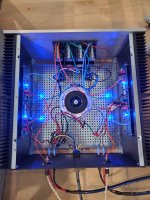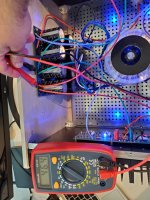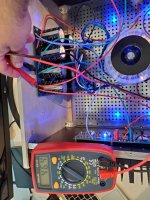Message to store to get an idea of when the things might be in stock. Usually it takes a month at the most if something goes out of stock. That is for the more common items.
Is the Aleph J a great next step? For a lot of people, heck yes. But it depends on what you want. Share what your thoughts are and what you're looking to get out of it.
You said you had some issues with soldering. What solder and soldering gun are you using? I was using cardis eutectic solder for quite a while and have recently switched to the fireball solder that the store carries. It's good stuff. Would I particularly like about it is the fact that The flux is easy to clean up. It also seems to flow pretty well.
If you don't have a Good soldering iron, I highly recommend the hakko fx888. Buy it once and you'll be happy for quite a long time. I had no interest in replacing mine and I've been using it for years pretty actively.
Is the Aleph J a great next step? For a lot of people, heck yes. But it depends on what you want. Share what your thoughts are and what you're looking to get out of it.
You said you had some issues with soldering. What solder and soldering gun are you using? I was using cardis eutectic solder for quite a while and have recently switched to the fireball solder that the store carries. It's good stuff. Would I particularly like about it is the fact that The flux is easy to clean up. It also seems to flow pretty well.
If you don't have a Good soldering iron, I highly recommend the hakko fx888. Buy it once and you'll be happy for quite a long time. I had no interest in replacing mine and I've been using it for years pretty actively.
Thanks for the reply mikerodrg27. i just emailed the store. As for what I'm looking for, i have some old proac response 1scs. I love how the aca sounds, but would like some more juice, some more clean headroom. My neighbor has a pass xa25 that I borrowed. 25 watts seems to be able to create enough clean power for the speakers in my space, so I thought I'd give one of the firstwatt designs a whirl. The aleph j seems like a design more suitable to lots of different speakers, but maybe I'm wrong there.
Ha. As far as solder, I was using radio shack everything. Now I've got the cardas solder and a very nice variable Weller, completely different ballgame now...
Ha. As far as solder, I was using radio shack everything. Now I've got the cardas solder and a very nice variable Weller, completely different ballgame now...
Those speakers look nice. So the Aleph is not the fastest most detailed or most dynamic amp. However, it has a very pleasing sound. It should differ from the XA25 quite a bit. Zen mod has an amp that should have a similar sound to the XA25 which is called the XA252. However, that probably requires a bit more experience. You can take a look and see what you think.
Depending on how those Proacs sound, the Aleph J could be a good choice. If the Proacs tend to be a fast speaker that reveals bad qualities of recordings etc, then the Aleph would be a nice amp that would smooth that out. If your speakers are 'slow' sounding, then I could see the Aleph being alright. Not bad but maybe just not as good as others.
The XA25 is a very stout and dynamic amplifier compared to a lot of these firstwatt designs. Super detailed. The Aleph doesn't have much in the way of bass. Not nearly as detailed as the XA25 but has more surgar.
The F6 is another amp to look at. A little more detailed less surgar than the aleph (Not dry by any means). A little more detailed, and goes into class B a bit. It will have better bass etc.
I will say that I have had an Aleph and a F6 and have enjoyed them both quite a bit. I think that with a nice efficient speaker, the Aleph is pretty darn special. The sound kind of floats in front of you and imaging on voices is very pretty.
So the nice thing about all of this is that you can always swap to a different firstwatt amplifier board in the future. The power supply requirements of these little clone amps are universal with only a few acceptions. Amp cases are universal as well but I advise you get a 5u case to future-proof in case you want to play around with some of the bigger variants.
Depending on how those Proacs sound, the Aleph J could be a good choice. If the Proacs tend to be a fast speaker that reveals bad qualities of recordings etc, then the Aleph would be a nice amp that would smooth that out. If your speakers are 'slow' sounding, then I could see the Aleph being alright. Not bad but maybe just not as good as others.
The XA25 is a very stout and dynamic amplifier compared to a lot of these firstwatt designs. Super detailed. The Aleph doesn't have much in the way of bass. Not nearly as detailed as the XA25 but has more surgar.
The F6 is another amp to look at. A little more detailed less surgar than the aleph (Not dry by any means). A little more detailed, and goes into class B a bit. It will have better bass etc.
I will say that I have had an Aleph and a F6 and have enjoyed them both quite a bit. I think that with a nice efficient speaker, the Aleph is pretty darn special. The sound kind of floats in front of you and imaging on voices is very pretty.
So the nice thing about all of this is that you can always swap to a different firstwatt amplifier board in the future. The power supply requirements of these little clone amps are universal with only a few acceptions. Amp cases are universal as well but I advise you get a 5u case to future-proof in case you want to play around with some of the bigger variants.
@pestoman - First, congratulations on two successful builds.  . Agreed with both previous replies. A few additions...
. Agreed with both previous replies. A few additions...
For the build guide, in addition to 6L6's exceptional work, check out this blog. https://diyalephj.blogspot.com/. To me, it's the first place to go for someone in your shoes. Just build it exactly like they did. Wait for things to be back in stock or ask around in the swap meet. However, if you want to dig a bit more... read below.
It's tough to do, but if you can, decide how "hooked" you are. It will help. Has the DIY bug bitten you, or are you looking to just build one more amp, the Aleph J? If the bug has bitten you, and/or if you would like some 'room for growth', there are a few other things that could help you expand in the future. Also, you may be able to get a few parts/boards sooner than the store has them stocked.
Below would assume you want to try some additional builds after the Aleph J and/or 'expand' your Aleph J. The PSU and the chassis are generally the two most expensive chunks of the build. The nice part is that they're both usable across a bazillion projects if you plan ahead just a bit.
For the build guide, in addition to 6L6's exceptional work, check out this blog. https://diyalephj.blogspot.com/. To me, it's the first place to go for someone in your shoes. Just build it exactly like they did. Wait for things to be back in stock or ask around in the swap meet. However, if you want to dig a bit more... read below.
It's tough to do, but if you can, decide how "hooked" you are. It will help. Has the DIY bug bitten you, or are you looking to just build one more amp, the Aleph J? If the bug has bitten you, and/or if you would like some 'room for growth', there are a few other things that could help you expand in the future. Also, you may be able to get a few parts/boards sooner than the store has them stocked.
Below would assume you want to try some additional builds after the Aleph J and/or 'expand' your Aleph J. The PSU and the chassis are generally the two most expensive chunks of the build. The nice part is that they're both usable across a bazillion projects if you plan ahead just a bit.
- As mentioned, if you have the space, a strong back, and the budget, getting the 5U deluxe is an excellent idea. More detail below.
- Extra space to build along with bigger heatsinks for potentially bigger projects or further tweaking is never a bad thing. A common thing for many builders is to add another PSU for a dual-mono build. Having a larger chassis makes that much easier.
- The deluxe versions are the only way to go, IMO. Pretapped UMS heatsinks and pre-cut back panels make life wonderful for people that don't love or have the patience and talent for metal working.
- IMO, the 4U Deluxe is ... not for me ... due to the 300 mm depth. However, it is a gorgeous chassis, and it is perfectly suitable for an Aleph J.
- For a PSU there are a few choices depending on your level of comfort with schematics and building. The easiest (IMO) is the Universal PSU, but there are a few options depending on your level of comfort, knowledge, and sense of adventure. More detail below.
- You can't go wrong with a basic CRC (used in the real First Watt Aleph J).
- Wait for the store to get boards or find someone with a spare set. This is easiest, simply because of the excellent build guides and overall ease of sourcing suitable components.
- Check out rhthatcher's boards - @rhthatcher. He has an Etsy store - ThatcherDIYAudio. Very easy to build, but no build guide. You'll perhaps need to ask for help if you're unfamiliar with PSU schematics. He's got several boards, which makes the build a bit more modular, and makes placement in the chassis simple.
- Two (at least) excellent versions for CRC filters. Can easily 'upgrade' to CLC etc. later if desired.
- A nifty solution for mounting monolithic rectifiers with the addition of the optional snubber (I think)
- Separate Thermistor "soft start" boards for easy mounting along with the safety cap (I think).
- Check out XRK971's @xrk971 Smooth Like Buttah (SLB) in his Etsy store, XRKAudio. It's a different style of PSU than the universal. It would require a bit more skill to build. There is no guide that I'm aware of. However, the performance is exceptional. Total build cost would likely be more than a basic CRC, but not necessarily a CLC supply. Note, you need a "Dual Rail" supply. If you're completely new, and if after reading a bit about it you're not sure ... maybe save something like that for a future project.
- You can't go wrong with a basic CRC (used in the real First Watt Aleph J).
Last edited:
Assuming this will be your first forey into a larger amp with an AC power supply, I would keep it simple and go with the 5U/400 chassis and a standard CRC power supply.
One thing I caution is that the XA25 can produce significantly more power than its nominal 25W rating. You might want to try this test just to make sure the voltage swing of the AJ will be enough for you:
https://www.diyaudio.com/community/...h-voltage-power-do-your-speakers-need.204857/
That said, given you already have good results with the ACA, you'll most likely be fine.
Another thing about being 'hooked' is that it can easily become a mild addiction, especially given the number of amazing projects available. (I know someone with a dozen class A amps due to said addition). Since many FW designs use the same power supply, a nice chassis with the USM drilled heatsinks will allow you to just switch out amp PCBs if you want to try something different, and hopefully keep the number of chassis in check.
And don't forget to spend some quality time with your new build before planning the next one.
One thing I caution is that the XA25 can produce significantly more power than its nominal 25W rating. You might want to try this test just to make sure the voltage swing of the AJ will be enough for you:
https://www.diyaudio.com/community/...h-voltage-power-do-your-speakers-need.204857/
That said, given you already have good results with the ACA, you'll most likely be fine.
Another thing about being 'hooked' is that it can easily become a mild addiction, especially given the number of amazing projects available. (I know someone with a dozen class A amps due to said addition). Since many FW designs use the same power supply, a nice chassis with the USM drilled heatsinks will allow you to just switch out amp PCBs if you want to try something different, and hopefully keep the number of chassis in check.
And don't forget to spend some quality time with your new build before planning the next one.
Wow. Thank you everyone. Point taken on the 5U chassis. I'll get that one. I think I'm going to go ahead with the Aleph for now, and either scrounge for parts, or wait for the store to restock. I think given my speakers and tastes, I'd probably like the F6 more, but that's what makes this all so much fun, is getting to try lots of things. I will spend some time researching different options for the power supply. Also thanks very much for the reminder on the mains voltage!
So .47ohm, 3W, 5% metal film resistors are like $7 per resistor on Mouser (which seems criminally insane), and $8 per resistor on DigiKey, and I need 30 of them. Can I substitute something like this in?
https://www.newark.com/multicomp-pro/mcknp03sj047ka19/res-0r47-3w-axial-wirewound/dp/55T6658
Or is that a no no? Do they need to be metal film? I have personal experience from testing out guitar amp circuits that even resistors can potentially carry a sound. But that would make these little resistors the most expensive part of the whole build besides the chassis.
Thank you as always!
https://www.newark.com/multicomp-pro/mcknp03sj047ka19/res-0r47-3w-axial-wirewound/dp/55T6658
Or is that a no no? Do they need to be metal film? I have personal experience from testing out guitar amp circuits that even resistors can potentially carry a sound. But that would make these little resistors the most expensive part of the whole build besides the chassis.
Thank you as always!
I found these at Digi-Key Canada at $13.95 Cdn for 50 pieces:
https://www.digikey.ca/en/products/detail/te-connectivity-passive-product/RR03JR47TB/2385069
https://www.digikey.ca/en/products/detail/te-connectivity-passive-product/RR03JR47TB/2385069
Pass Labs uses these although this line of Panasonic's resistors has been discontinued so...
https://www.arrow.com/en/products/erx-3sjr47/panasonic
I just ordered 300 of them myself. Worth the shipping. Arrow tends to have some parts a lot cheaper than other places, some more expensive. If I have a lot to order, I price parts out on each one and add them to the cart of the cheaper supplier. That typically offsets the extra shipping charge. A lot of these Pass diy projects have these 3w 0.47R resistors in them, 1 ohm is another popular value
https://www.arrow.com/en/products/erx-3sjr47/panasonic
I just ordered 300 of them myself. Worth the shipping. Arrow tends to have some parts a lot cheaper than other places, some more expensive. If I have a lot to order, I price parts out on each one and add them to the cart of the cheaper supplier. That typically offsets the extra shipping charge. A lot of these Pass diy projects have these 3w 0.47R resistors in them, 1 ohm is another popular value
Well, here's a pic, reading 46.4v ac, far as I can tell. It sounds incredible, I have the bias right at 400 on each channel with close to 0 offset. When I switch to DC on the multimeter, it reads like 22 to 23 v. Temperatures read just fine too.
Attachments
Yeah good call. I dug around on this and it seems that cheaper multimeters can only measure ac voltage when there's actually a sine wave present. If there's only DC current present, there's an algorithm it uses that gets confused and just reads double the DC voltage as AC. My AA battery read 3v.
One maybe last question here? Any reason to play with the bias on this amp? I've had it dialed in at 400mV since I made it. I've read about people upping it to 450 or even 500 with the 5U chassis to dissipate the additional heat off the mosfets. Why would one deviate from the spec 400?
- Home
- Amplifiers
- Pass Labs
- Aleph J for Universal Mounting Spec



